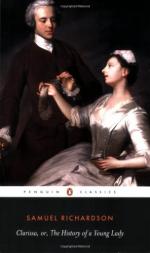For, is not Mr. Lovelace, who could persevere in his villanous views, against the strongest and most frequent convictions and remorses that ever were sent to awaken and reclaim a wicked man—is not this great, this wilful transgressor condignly punished; and his punishment brought on through the intelligence of the very Joseph Leman whom he had corrupted;* and by means of the very woman whom he had debauched**—is not Mr. Belton, who had an uncle’s hastened death to answer for***—are not the infamous Sinclair and her wretched partners—and even the wicked servants, who, with their eyes open, contributed their parts to the carrying on of the vile schemes of their respective principals—are they not all likewise exemplarily punished?
* See Letter LVIII. of this volume. ** Ibid. Letter LXI. *** See Vol. VIII. Letter XVI.
On the other hand, is not Miss Howe, for her noble friendship to the exalted lady in her calamities—is not Mr. Hickman, for his unexceptionable morals, and integrity of life—is not the repentant and not ungenerous Belford—is not the worthy Norton—made signally happy?
And who that are in earnest in their professions of Christianity, but will rather envy than regret the triumphant death of Clarissa; whose piety, from her early childhood; whose diffusive charity; whose steady virtue; whose Christian humility, whose forgiving spirit; whose meekness, and resignation, heaven only could reward?*
* And here it may not be amiss to remind the reader, that so early in the work as Vol. II. Letter XXXVIII. the dispensations of Providence are justified by herself. And thus she ends her reflections—’I shall not live always—may my closing scene be happy!’—She had her wish. It was happy.
We shall now, according to the expectation given in the Preface to this edition, proceed to take brief notice of such other objections as have come to our knowledge: for, as is there said, ’This work being addressed to the public as a history of life and manners, those parts of it which are proposed to carry with them the force of example, ought to be as unobjectionable as is consistent with the design of the whole, and with human nature.’
Several persons have censured the heroine as too cold in her love, too haughty, and even sometimes provoking. But we may presume to say, that this objection has arisen from want of attention to the story, to the character of Clarissa, and to her particular situation.
It was not intended that she should be in love, but in liking only, if that expression may be admitted. It is meant to be every where inculcated in the story for example sake, that she never would have married Mr. Lovelace, because of his immoralities, had she been left to herself; and that of her ruin was principally owing to the persecutions of her friends.




